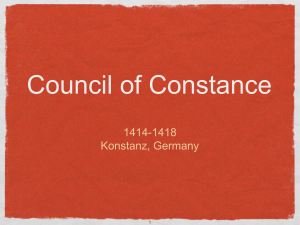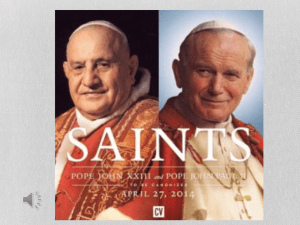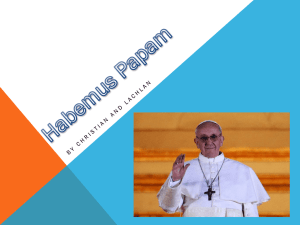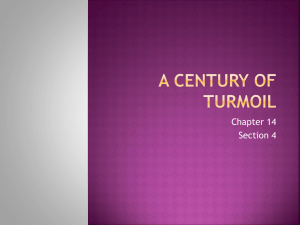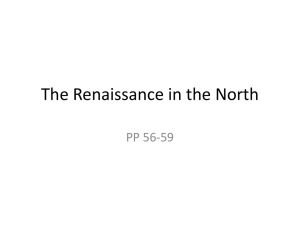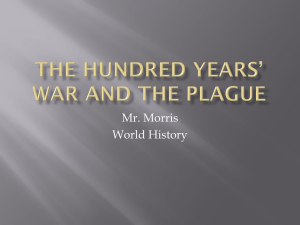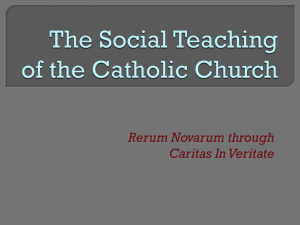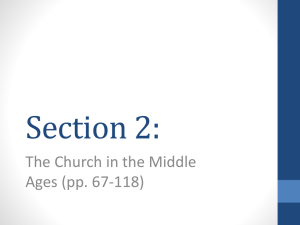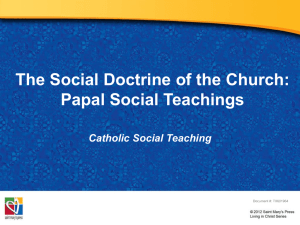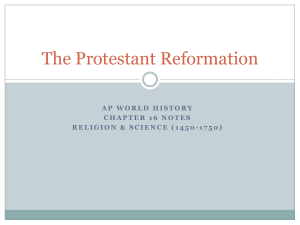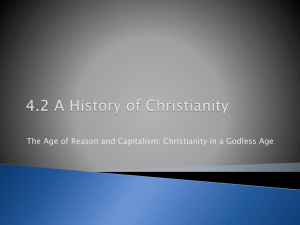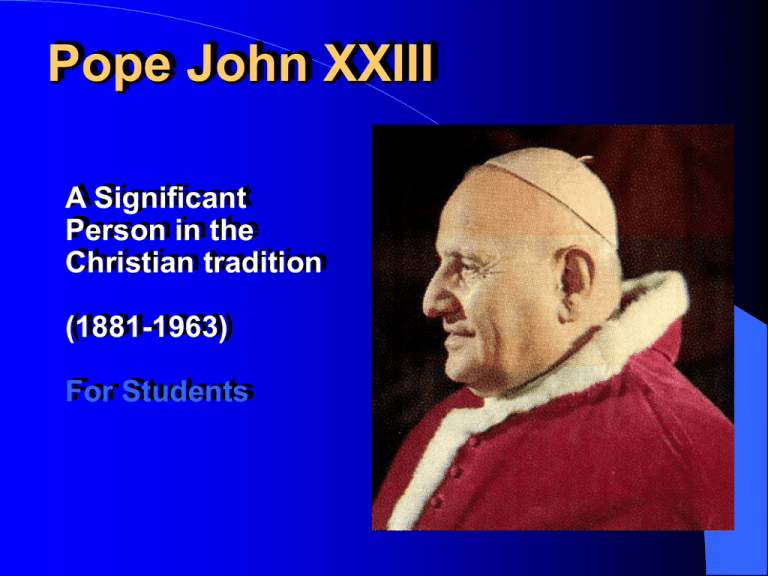
Pope John XXIII
A Significant
Person in the
Christian tradition
(1881-1963)
For Students
Life of Pope John XXIII in a nutshell…
25 Nov – born Angelo
Giuseppe Roncalli
1881,
Papal
Predecessor – Pius XII
1958 – elected John XXIII; 262nd
i
Pope of Roman Catholic Church;
aged 76; pontificate lasts 5 years
1963,
June 3 –dies aged 81
Papal
Successor – Paul VI
Sept 3 – declared ‘Blessed’ by
Pope John Paul II
(see sermon in Notes)
2000,
John XXIII – Coats of Arms
Coat of arms for Angelo
Roncalli as Patriarch of
Venice (1953-1958). Motto of
‘Obedientia et Pax’
(Obedience and Peace)
i
Papal coat of arms for
Pope John XXIII (1958-1963)
NB Venetian lion derived from St
Mark’s Gospel in both coats of arms
Significant dates in the life of
Pope John XXIII (1)
1881, 25 Nov – born Angelo Giuseppe
Roncalli, in Sotto il Monte, Italy, the 4th in a
family of 13 children
1896 – admitted to secular Franciscan Order
by spiritual director in Bergamo seminary
1901-1905 – student at Pontifical Roman
Seminary; all early appointments by Pius
XII
i
1904, 10 Aug – ordained a priest in Rome
1905 – Bishop of Bergamo appoints Roncalli
as his secretary
1914-1919 – WWI – Roncalli drafted into
Royal Italian Army as a sergeant; he serves in
medical core as chaplain. Opens a ‘Student
House’ after War to help their spiritual needs
1921 – appointed by new Pope Benedict XV Fr. Angelo Roncalli (centre) in
seminary or as Bishop’s secretary,
as Italian president of Society for the
1905-1909??
Propagation of the Faith
Significant dates - Pope John XXIII (2)
– appointed by Pope Pius XI
as Apostolic Visitor to Bulgaria; then
consecrated as titular bishop of
Areopolis. Chooses as his episcopal
motto ‘Obedientia et Pax’
(Obedience & Peace), which
became his lifelong motto
1935 – appointed Apostolic
Delegate to Turkey and Greece.
Helped Jewish underground to save
thousands of refugees in Europe –
afterwards considered a Righteous
Gentile
1944 – Pope Pius XII named him
Apostolic Nuncio to Paris, France
1925
i
DYK - After he was elected, John
XXIII spent much time at night
visiting prisoners and the poor
Significant dates - Pope John XXIII (3)
– worked on UN
Declaration of Human Rights whilst
in Paris, France
1953 – named Patriarch of Venice
and therefore raised to rank of
Cardinal
1958, 28 Oct – Papal conclave
elects him as Pope John XXIII.i Had
arrived at Vatican with a return ticket
to Venice. Because of long
pontificate of Pope Pius XII,
cardinals choose older man as ‘stop
gap’ pope. He is 77 years old at
election. Cardinal Montini (future
Paul VI) is expected to be elected,
but he was not yet a cardinal. Is last
to insist on full 5 hr papal ceremony
1944-1953
Significant dates - Pope John XXIII (4)
Dec 2 – meets Archbishop of Canterbury,
Most Rev Geoffrey Francis Fisher
1961 – issues Mater et Magistra
1962, Jan 3 – excommunicates Fidel Castro, being
a Catholic linked to a communist government
1962, Sept 23 – John XXIII first diagnosed with
stomach cancer (a fact kept from the public for some
i
8 years)
1962-1965 – less than 90 years after Vatican I, he
convenes the ecumenical Vatican II Council
1963 – issues Pacem in Terris
1963, April – gives hint of his illness when he says:
“That which happens to all men [sic] perhaps will
happen soon to the Pope who speaks to you today”
1963, May 11 – awarded Balzan Prize for his
engagement for peace. This was his last public
appearance
1960,
Significant dates in the life of
Pope John XXIII (5)
May 25 – suffers another haemorrhage,
requires blood transfusions, developed
peritonitis (inflammation of sac that lines walls of
abdominal cavity)
1963, June 3 – dies 7.49 pm, aged 81
1963, June 6 – is buried, ending a papal
reign
i
of 4 years, 7 months, 6 days. He is the last pope
to insist on a full papal funeral
1963, Dec 6 – U.S. President Lyndon B.
Johnson awards him the posthumous
Presidential Medal of Freedom, the highest U.S.
civilian award
2000, Sept 3 – John XXIII is declared ‘Blessed’
by Pope John Paul II
1963,
(Principal source: Wikipedia website)
John XXIII’s [immediate, life-focused]
contribution to Christianity (1)
explain the [immediate]
contribution to the
development and
expression of
Christianity of John
XXIII
Explain = relates cause
and effect, the
relationship between
aspects of something,
the why and how
behind it
DID YOU KNOW? Pope John XXIII was
TIME magazine’s ‘Man of the Year’ in their
Jan 4, 1965 issue. He had died in June 1963.
John XXIII’s contribution to Christianity? (2)
Summoned Second Vatican Council
(1962-1965), enacted major revision of
the Code of Canon Law; transformed
the structures of the Roman Catholic
Church
Vatican II charged with the updating
(aggiornamento) of the Church and
seeking unity between Christians in the
world (Hinnells, p.192)
Through his personality and teaching,
and his initiatives with world leaders, he
gave the papacy a new vision and set
the Church towards a new mission in
the world
(both quotes from: P. Hebblethwaite,
2000, John XXIII, back cover)
John XXIII’s contribution to Christianity? (3)
He changed the nature of modern
Church Councils. He did not call a
council to condemn errors or declare new
infallible beliefs, as with previous
councils – his council was one of mercy
and pastoral care, to express faith in a
new language, and be ecumenical in
nature (Hebblethwaite in McBrien, p.709)
Pastoral emphasis of his pontificate is
emphasised by his visits to the Regina
Coeli prison; he talked with traditional
enemies like the Communists; he made
grace accessible to ordinary people; he
was open to the Holy Spirit; he was atune
to ‘the signs of the times’ [cf. Gaudium et
spes, n.1] (Ibid, p.709; cf 14 Works of Mercy,
Slide 28 below)
John XXIII’s contribution to
Christianity? (4)
He communicated using effective
images. We are born not to be ‘museum
keepers, but to cultivate a flourishing
garden of life’. He referred to Vatican II
as ‘the new Pentecost’. The prayer for
the Council was: ‘Renew thy wonders
in this day, as by a New Pentecost’
(Hebblethwaite in McBrien, p.709)
Transformation of the Church’s
nature – the Council would involve ‘a
change in mentalities, ways of thinking
and prejudices’; its language would
‘shed light on and remove
misunderstandings, and it should
dissipate error by the force of truth’
(Ibid, p.709)
John XXIII’s contribution to
Christianity? (5)
His life & mission was based on a
personal spirituality of the Crucified
and Risen Christ. The Council
represented ‘a way of self-renewal
through an encounter with the Risen
Jesus…whose light illumines the whole
Church for the salvation, joy and glory
of all peoples’ (Hebblethwaite in McBrien,
p.710)
His key distinction between the
Church ad intra and the Church ad
extra – that is: internal questions
(worship, ecumenism, etc) and external
questions (war, peace, birth control,
hunger, poverty, etc) (Ibid, p.710)
John XXIII’s contribution to Christianity? (6)
His scholarly contribution was to edit
the writings of St Charles Borromeo (in
39 volumes). This took a lifetime with
volumes appearing in 1936, 1937, 1938,
1946 and 1957 (Hebblethwaite, p.30). He had
academic specialisation in history,
patrology, apologetics, and was a much
sought after preacher/spiritual adviser
(Vatican website, biography)
As John XXIII said at the opening of
the Council (11 Oct 1962) ‘History is
the teacher of life’
Among his first actions upon election as
Pope was the creation of 23 new
cardinals in Dec 1958; by 1962 he had
increased the number of new cardinals
to 87.
John XXIII’s contribution to
Christianity? (7)
Justice, peace and politics –
In 1909, Roncalli backs Bishop
Tedeschi in Church support of
a strike by 800 textile workers
in a factory just outside
Bergamo (Hebblethwaite, p.34)
‘The priest who lives in the
light of the teachings of the
Gospel cannot pass by on the
other side of the road…
Christ’s preference goes to
the disinherited, the weak
and the oppressed’ (Roncalli’s
article, cited in Hebblethwaite, p.34)
John XXIII’s contribution to Christianity? (8)
Ecumenism – Cardinal Roncalli’s
ongoing meetings with representatives
of the Ecumenical Patriarch (e.g. 1938
after election of Pius XII) paved the way
for the ‘kiss of peace’ between Patriarch
Athenagoras and Paul VI, in Jerusalem,
in January 1964 (Hebblethwaite, p.78)
1960, Dec 2 – meets Archbishop of
Canterbury, Most Rev. Geoffrey Francis
Fisher
1962 – fewer than 90 yrs after Vatican I,
he convenes the ecumenical council
Vatican II – it reshapes liturgy,
ecumenism, biblical scholarship, and
the approach of the Church to the world
John XXIII’s contribution to Christianity? (9)
Called Church to be Prophetic within
(not apart from) the Modern World –
John XXIII understood that the world
was changing and that the Church
needed to respond to the stirrings of the
Holy Spirit by working through ‘the
signs of the times’. In doing so, he was
committed to Christian unity, social
justice, human rights, and the cultivation
of world peace (ND Vision site)
Influence on the Church Documents,
especially: through his opening address
at Vatican II; the Declaration on
Religious Freedom; and the Pastoral
Constitution on the Church in the
Modern World (probably the most
important of the Vatican II documents)
(Medal of Freedom website)
The [long term] impact of John XXIII
on Christianity? (1)
analyse the impact of John
XXIII on Christianity
Analyse = identify
components and the
relationship between
components; draw out and
relate implications
Looks at the relationship
between John XXIII and
Christianity, including his
[long term?] impact on
Christianity
The impact of John XXIII
on Christianity? (2a)
SPIRITUALITY – HIS ‘RULES OF LIFE’
Daily discipline – at least 15 mins mental
prayer per day; read whole chapter of
The Imitation of Christ; examine
conscience; prepared meditation for next
day; visit to Blessed Sacrament; 5 Hail
Marys + Our Fathers repeated between
6-9pm in honour of 5 wounds of Jesus
on the Cross
Weekly – Confession & Communion;
Daily Mass but weekly Communion
(Jansenist legacy); fasted Fridays and
Saturdays, performing penance
Monthly – meeting with his spiritual
director; set aside one day for more
profound recollection; person for
advertisement of defects; chose a
special patron saint for each month
(Hebblethwaite, p.11)
The impact of John XXIII
on Christianity? (2b)
SPIRITUALITY – HIS ‘RULES OF
LIFE’ [continued]
Annually – would make a yearly
retreat in a seminary, choosing
Carnivale time in order to be praying
harder while others feasted and
revelled; Annual General Confession
(Hebblethwaite, p.11)
‘Roncalli was always good at
remembering anniversaries and
feastdays, and performing small
thoughtful kindnesses. Life, as the
spiritual writers said, is made up of
little things’ (Ibid, p.11)
The impact of John XXIII
on Christianity? (3)
SPIRITUAL AUTOBIOGRAPHY Wrote
Journal of a Soul (named by others) based
on model of St Therese of Lisieux’s Story of
a Soul. John described it as ‘sixty years
spent with a pen’. He began it in 1895,
aged 14, until his death in 1963.
(Hebblethwaite, p.ix)
LIFE CENTRED ON PRAYER
His light went on at 4 am, sometimes 3 am.
‘I always get up at four in the morning; it’s
my time…one prays so well at first light,
when everything is silent’ (Ibid, p.ix)
SPIRITUAL MOTTOS
‘Obedience and Peace’ (Patriarchate of
Venice); ‘Through Mary to Jesus’ (over the
door of his chapel in Istanbul)
The impact of John XXIII
on Christianity? (4)
SPIRITUAL INSPIRATIONS
Thomas à Kempis, The Imitation of Christ;
also inspired by Sts Peter & Paul, St
Joseph, and strong spirituality based on St
Charles Borromeo and St Francis de Sales;
plus devotion to Sacred Heart. Also
spirituality of St Bernard of Clairvaux and
14 Works of Mercy. (Ibid, pp.x, 7-8, 11, 13; refer
to Slides 27 & 28).
OPENNESS TO THE POOR
John came from a poor childhood; his
mother would always welcome & sit down a
stranger at one of their meals. The
Roncallis knew their Bible: ‘Do not neglect
to show hospitality to strangers, for thereby
some have entertained angels unawares’
(Heb 13:2) (Ibid, p.3)
The impact of John XXIII
on Christianity? (5)
THE WILL OF GOD AS CENTRAL
‘Let your will be mine, and let my will ever
respond to yours, in perfect harmony. Let me
desire what you desire and hate what you
hate, and let me desire and hate nothing but
what you desire and hate’ (Journal, p.11, cited in
Hebblethwaite, p.12)
SPIRITUALITY OF PEACE
‘You are the true peace of the heart, you are
its only resting place…In this peace, in this
very peace which is yourself the one,
supreme, eternal God, I will sleep and rest’
(Journal, p.11, based on Imitation of Christ, Bk 3, Ch 15,
cited in Hebblethwaite, p.12)
AT TIMES – CERTAIN DISDAIN OF WORLD
‘O the world is so ugly, filthy and loathsome!
In my year of military service I have learned
all about it. The army is a running fountain of
pollution, enough to submerge whole cities.
Who can hope to escape from this flood of
slime, unless God comes to his aid’ (Journal,
pp.92-93, cited in Hebblethwaite, p.18)
The impact of John XXIII
on Christianity? (6)
IMPACT OF WORKER-PRIESTS
Many priests from prison camps or
resistance movements looking for a
new form of ministry immersed in
lives of normal people; e.g. around
1947 (Hebblethwaite, p.105)
THE FOUR THINGS THAT BRING
GREAT INWARD PEACE
‘Choose always to have less rather
than more.
Seek always the lowest place and to
be beneath everyone.
Seek always and pray that the will of
God may be wholly fulfilled in you.
Behold, such a man [sic] enters within
the borders of peace and rest’ (Imitation
of Christ, Bk III, Ch 23, cited in Hebblethwaite,
p.115)
Spirituality of St Bernard of Clairvaux
(1090-1153 : contemporary of Hildegard)
Peace within the cell: fierce
warfare without,
Hear all; believe a few; honour
all.
Do not believe everything you
hear;
Do not judge everything you see:
Do not do everything you can;
Do not give everything you have;
Do not say everything you know.
Pray, read, withdraw, be silent,
be at peace.
(Journal , p.40, cited in Hebblethwaite,
pp.7-8)
Spirituality based on 14 works of mercy
Based on Mt 25:34-40; Isa 58:6-10
7 Corporal works of mercy
–
–
–
–
–
–
–
Feed the hungry
Give drink to the thirsty
Clothe the naked
Visit the imprisoned
Shelter the homeless
Visit the sick
Bury the dead
7 Spiritual works of mercy
–
–
–
–
–
–
–
Admonish the sinner
Instruct the ignorant
Counsel the doubtful
Comfort the sorrowful
Bear wrongs patiently
Forgive all injuries
Pray for the living and the dead
(Journal , 26 Dec 1958, cited in Hebblethwaite, p.154; cf.
McBrien, pp.854-55)
Some key passages from the
writings of John XXIII (1)
‘We
are not on earth
to guard a museum
but to cultivate a
flourishing garden of
life’
(Source: Lettere, p.481; cited in:
Hebblethwaite, p.131; for icon see
Robert Lenz website at
www.bridgebuildingicons.com )
Some key passages from the
writings of John XXIII (2)
‘What counts most in
this life is blessed Jesus
Christ, his holy Church,
his Gospel, truth and
goodness’
(University of Notre Dame, ND Vision
website)
‘You could not come to
me, so I came to you’
(Words to Prisoners whom he visited
after becoming Pope)
Key passages - John XXIII (3)
‘The faithful saw in him a
reflection of the goodness of
God, and called him ‘the good
pope’’ (Vatican site)
‘Anybody can be Pope; the proof
of this is that I have become one’
‘Born poor, but of honoured and
humble people, I am proud to die
poor’
‘Consult not your fears but your
hopes and your dreams…
Concern yourself not with what
you tried and failed at, but what
it is still possible for you to do’
‘I have looked into your eyes
with my eyes. I have drawn near
to your heart’
John XXIII signing Pacem in Terris
in 1963; NB thin & sick due to cancer
Key passages - John XXIII (4)
‘It often happens that I wake up at
night and begin to worry about a
serious problem and decide I must
tell the Pope about it. Then I wake
up completely and remember that
I am the Pope’
‘Italians come to ruin most
generally in three ways – women,
gambling and farming. My family
chose the slowest and most boring
of the three’
‘See everything, overlook a great
deal, correct a little, show
compassion in all things’
John XXIII - ‘Did you know?’ (1)
‘There was no Pope
John XX due to
confusion among the
papal historians and
following a number
of antipopes’
(NB Do not confuse the
modern John XXIII
(1881-1963) with John
XXIII, antipope from
1410-1415)
John XXIII - ‘Did you know?’ (2)
John XXIII began
Vatican II in
1962 –
Paul VI finished
Vatican II in
1965
John XXIII - ‘Did you know?’ (3)
After he was elected pope, aged
76, John XXIII immediately
made Giovanni Montini a
cardinal (future Paul VI)
He then went to the Holy Office
(in charge of guarding against
heresy) and looked up his own
file. A note was attached:
‘suspected of Modernism’. This
was one reason why his career
had been ruined or delayed
thirty years beforehand.
(mcs.drexel site)
John XXIII - ‘Did you know?’ (4)
The Pope as Angelo
Roncalli entered salvation
history in 1881. Also born
in that same year were:
Pierre Teilhard de
Chardin, Jesuit
paleontologist, mystic
Alcide De Gaspen, future
leader of the Christian
democrats
Augustin Bea, became
founder-president of
Secretariat for Christian
Unity
(all from Hebblethwaite, p.xi)
John XXIII - ‘Did you know?’ (5)
John XXIII composed the
equivalent of his ‘last will and
testament’ with the encyclical
Pacem in Terris on universal
peace; this was his final mandate
for the Council which he had
begun (Hebblethwaite in McBrien, p.710)
Realising that he would soon die,
he said to a friend: ‘At least I
have launched this big ship [the
Council] – others will have to
bring it into port’ (Ibid, p.710)
Summary of Major Documents – John XXIII
Mater et Magistra: Mother and
Teacher (1961)
– Identifies the widening gap between
the rich and poor nations as a global
concern of justice
– Raises concerns about the arms race
– Calls upon Christians to work for a
more just world
Pacem in Terris: Peace on Earth
(1963)
– Focus on human rights as the basis for
peace;
– Calls for disarmament
– Stating the need for a world-wide
institution to promote and safeguard
the universal common good
(Source: http://sao.clriq.org.au/cst/cst_intro.html)
Bibliography & References (1)
NB All websites retrieved Nov 2006
Hebblethwaite, Peter. (2000). John XXIII, Pope of the century. Revised Margaret
Hebblethwaite; London: Continuum.
Hinnells, John R. (ed.). (1991). Who’s Who of Religions. London: Penguin. ‘John
XXIII’, p.192.
Mc Bride, Alfred. (1996). A Retreat with Pope John XXIII: Opening Windows to
Wisdom. St. Anthony Messenger Press.
McBrien, Richard P. (Gen. Ed.). (1995). The HarperCollins Encyclopedia of
Catholicism. New York: HarperCollinsPublishers. ‘John XXIII’ by Peter
Hebblethwaite, pp.709-710. NB: Probably the best single source brief summary of
John XXIII’s life and contributions to the Council and the Church in general.
Morrissey, J., Mudge, P., Taylor, A., et al. (2005). Living Religion, 3rd Edition.
Melbourne: Pearson Longman, pp.306-310.
Pope John Paul XXIII (28 Oct 1958 – 3 June, 1963) – Online Papal document for
his papacy www.papalencyclicals.net/John23/index.htm
Summary of Main Encyclicals and Documents – Social Justice
http://sao.clriq.org.au/cst/cst_intro.html
Bibliography & References (3)
NB All websites retrieved Nov 2006
Almost a Saint: Pope John XXIII; St Anthony Messenger
www.americancatholic.org/Messenger/Nov1996/feature1.asp
Homily by John Paul II, Beatification of John XXIII – took place 3
September 2000
www.va/news_services/liturgy/saints/ns_lit_doc_200000903_johnxxiii_en.html
Overview of Church’s thinking on Human Rights (search site under
Australian Catholic Bishops’ Conference, author Sandi Cornish)
Pope John XXIII – a brief biography, Notre Dame Vision
www.nd.edu/~ndvi/pages/inspiration/models/019.html
Pope John XXIII – Illuminating Lives
www.mcs.drexel.edu/~gbrandal/Illum_html/JohnXXIII.html
Pope John XXIII – Wikipedia
http://en.wikipedia.org/wiki/Pope_John_XXIII

